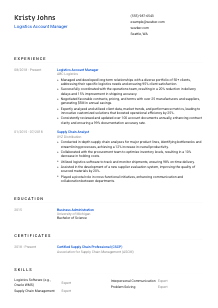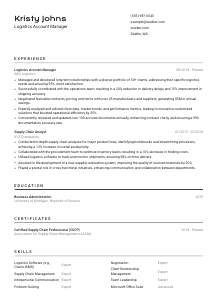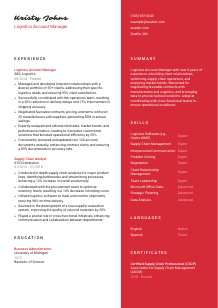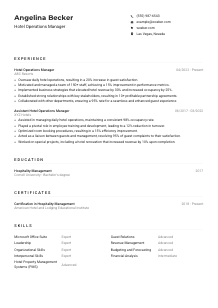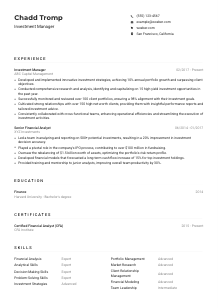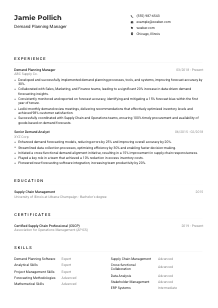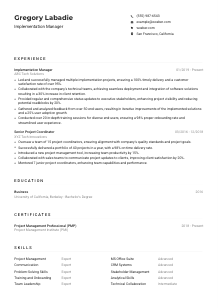Logistics Account Manager Resume Example
Orchestrating shipments, but your resume feels stuck in customs? Navigate this Logistics Account Manager resume example, streamlined with Wozber free resume builder. Learn how to sync your coordination prowess with job specifics, ensuring your career journey flows as smoothly as a well-planned supply chain!
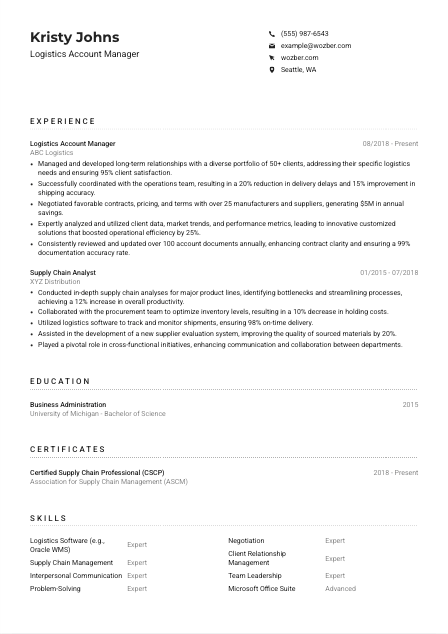
How to write a Logistics Account Manager resume?
Hello, aspiring Logistics Account Manager! If you're looking to steer your career towards success in the logistics field, your resume isn't just a document – it's the compass that guides hiring managers to your skills and experiences. Using Wozber, we're about to navigate the process of creating a resume that's not only tailored specifically to your desired Logistics Account Manager position but is also optimized for Applicant Tracking Systems (ATS). Get ready to embark on a journey that transforms your resume into a testimonial of your logistics prowess, perfectly aligned with industry demands.
Personal Details
The way you present yourself in the Personal Details section sets the tone for the rest of your resume. This is where meticulous attention to detail comes into play, ensuring every piece of information is not just there but speaks volume of your professionalism and readiness for the Logistics Account Manager position. Let's delve into how to nail this section with precision.
1. Brand Yourself
Your name is the banner under which your entire career stands. Make it memorable and easy to spot with a clean, standout font. This is where the eye lands first, so let it find what it's looking for without any effort.
2. Job Title Alignment
Right below your name, place the title 'Logistics Account Manager'. It's like telling the hiring manager, 'This is me, and this is what I'm great at.' It's a simple yet effective way to mirror the job description and subtly align your resume from the get-go.
3. Essential Contact Info
In the realm of Logistics Account Management, details matter. Your phone number and email should be front and center – a clear invitation to connect. Stick to a professional email format, and consider including a link to your LinkedIn profile if it's well-curated and mirrors your resume's narrative.
4. Location Matters
"Seattle, WA" isn't just an address; it's an assurance. If you already are where the job is, it's a logistical plus. If not, indicating willingness to relocate (or the process underway) answers a key logistical question upfront.
5. Web Presence
In our digital age, a professional online presence can set you apart. A LinkedIn profile or a personal portfolio that showcases your projects or accomplishments can be a strong ally. Just make sure it's streamlined and professional, echoing the strengths and skills your resume highlights.
Takeaway
Your Personal Details section is much more than basic contact information. It's the prelude to your story, setting a professional and relevant tone for the hiring manager. Ensure it's crisp, clear, and aligned with the Logistics Account Manager role. This first impression counts, so make it a strong one!





Experience
The Experience section is your battleground where you demonstrate your expertise and achievements. For a Logistics Account Manager role, it's about showing not just what you've done, but how what you've done aligns perfectly with what you'll be doing. Here's how to make your experience speak the language of logistics excellence.
- Managed and developed long‑term relationships with a diverse portfolio of 50+ clients, addressing their specific logistics needs and ensuring 95% client satisfaction.
- Successfully coordinated with the operations team, resulting in a 20% reduction in delivery delays and 15% improvement in shipping accuracy.
- Negotiated favorable contracts, pricing, and terms with over 25 manufacturers and suppliers, generating $5M in annual savings.
- Expertly analyzed and utilized client data, market trends, and performance metrics, leading to innovative customized solutions that boosted operational efficiency by 25%.
- Consistently reviewed and updated over 100 account documents annually, enhancing contract clarity and ensuring a 99% documentation accuracy rate.
- Conducted in‑depth supply chain analyses for major product lines, identifying bottlenecks and streamlining processes, achieving a 12% increase in overall productivity.
- Collaborated with the procurement team to optimize inventory levels, resulting in a 10% decrease in holding costs.
- Utilized logistics software to track and monitor shipments, ensuring 98% on‑time delivery.
- Assisted in the development of a new supplier evaluation system, improving the quality of sourced materials by 20%.
- Played a pivotal role in cross‑functional initiatives, enhancing communication and collaboration between departments.
1. Job Requirement Analysis
Start by dissecting the job description. For this Logistics Account Manager position, managing relationships, coordinating with teams for smooth workflow, and analyzing data for customized solutions are key. These become the compass for curating your experience stories.
2. Organize Logistically
Listing your roles, it's essential to keep a chronological order, leading with your current or most recent position. Ensure the job title, company name, and the period of employment are clearly stated. This clean organization is itself a testament to your management skills.
3. Tailored Accomplishment Statements
In a field like logistics, numbers talk. Quantify your achievements to show tangible impact, like "Negotiated contracts with suppliers, generating $5M in annual savings." This demonstrates not just your role but your effectiveness within it.
4. Highlight Relevance
Not all your achievements will have a direct correlation, but your resume needs those that do. Stick to the ones that scream logistics and management prowess. This is not just about what you've done, but how what you've done prepares you for what's next.
5. Propriety and Precision
Have you implemented a new logistics software that revolutionized your company's operations? Or maybe you excelled in client satisfaction within logistics accounts? These specifics give life to your experience, showing you're not just in logistics; you embody its very essence and evolution.
Takeaway
Remember, the Experience section of your resume is not just about listing jobs; it's about storytelling. Each bullet point should be a narrative of success, relevance, and direct correlation to the Logistics Account Manager position. Make each word count, each number prove its worth, and let your logistics narrative shine.
Education
In the realm of Logistics Account Management, your education forms the bedrock of your expertise. Tailoring the Education section to resonate with the job's demands conveys not just your qualification, but your specific alignment with the logistics profession's requirements. Let's chart the course.
1. Match the Degree
The job calls for a "Bachelor's degree in Business, Supply Chain Management, or a related field." If your degree aligns, make it known. For instance, a 'Bachelor of Science in Business Administration' clearly echoes the educational foundation sought.
2. Simplify and Streamline
List your degree, the institution, and your graduation year in a clean, straightforward manner. This clarity speaks to your organizational abilities, a key trait for a Logistics Account Manager.
3. Reflect Relevance
If your degree is exactly in a field mentioned in the job description, let it shine. Should your degree be in a closely related area, articulate its relevance. How did it prepare you specifically for the challenges of the logistics field?
4. Course Highlights
Particularly if just embarking on your logistics career, relevant courses can underscore your readiness. Maybe you aced Logistics Management 101, or Supply Chain Optimization caught your fascination – these are not just classes; they're your early career highlights.
5. Additional Credentials
Graduating suma cum laude or being active in the Supply Chain Management Association? These accolades and involvements add depth to your academic portrait, hinting at your engagement and passion for the field beyond the classroom.
Takeaway
The Education section of your resume should not just check a box. It's an opportunity to showcase your foundational knowledge and the specific ways in which your academic path has prepared you for a career in Logistics Account Management. Let your educational background be not just a requisite, but a compelling part of your story.
Certificates
Certificates are your arsenal for demonstrating continued professional development and specialization. In a field that values certifications such as Certified Supply Chain Professional (CSCP) and Certified in Production and Inventory Management (CPIM), showcasing these credentials can set you apart. Let's delve into strategically presenting your certificates.
1. Key Requirement Alignment
With certifications like CSCP and CPIM highlighted as pluses, featuring these on your resume is a must if you have them. They underscore not just your knowledge but your dedication to staying at the forefront of logistics and supply chain management.
2. Prioritize Relevance
In the field of logistics, the right certifications speak volumes. List those first that are directly aligned with the job's demands. This shows you're not just accredited; you're strategically prepared.
3. Stay Current
Validity dates can communicate the currency of your knowledge. An ongoing CSCP certification, for instance, demonstrates you're not resting on past laurels but are continuously engaged in professional growth.
4. Seek Growth
The landscape of logistics and supply chain management evolves rapidly. Stay proactive in seeking out new learning opportunities, especially those that align with the trajectory of Logistics Account Management. This proactive learning mindset is a tangible asset.
Takeaway
Use your certifications section to illustrate an ongoing commitment to professional excellence and relevance in the logistics field. Each certificate you list is a testament to your expertise and an indicator of your proactive attitude towards career growth. Keep learning, keep growing, and let your certificates highlight the cutting edge of your logistics prowess.
Skills
The Skills section is where your resume says, 'Here's what I bring to your logistics operations.' It's a concise showcase of both the hard and soft skills you've mastered. For a Logistics Account Manager role, balancing technical proficiency with excellent interpersonal abilities is key. Let's pinpoint how to curate this section for maximum impact.
1. Skills Dissection
Start by extracting both explicit and implicit skills from the job description. Proficiency in logistics software, supply chain management, and stellar communication are explicitly mentioned. Implicit? Think problem-solving, negotiation, and strategic planning.
2. Alignment and Presentation
Matching your skills to those listed and implied in the job description isn't just about ticking boxes; it's about demonstrating a perfect fit. Each skill you list should echo an aspect of the job, organized for clarity and impact.
3. Focus and Relevance
While you may have a wide array of skills, concentrate on those most relevant to the Logistics Account Manager role. This isn't just a list; it's a curated selection that advertises you as the solution to their logistics challenges.
Takeaway
Approach your Skills section with the mindset of offering a preview of your professional capabilities. This is your chance to resonate with the hiring manager by presenting a match between your expertise and the job's requirements. Keep it focused, relevant, and aligned, underscoring your readiness to excel in the logistics domain.
Languages
In today's global market, the ability to navigate language barriers is a prized asset, especially in logistics where cross-border transactions are routine. Flaunting your linguistic prowess can elevate your resume, presenting you as a global thinker ready for logistics challenges worldwide. Here's how to leverage your language skills effectively.
1. Necessity and Advantage
Begin with the absolute necessities – proficient English language communication is a must. But don't stop there; each additional language serves as a bridge to new markets and new opportunities. Highlighting your multilingual abilities can set you apart as a candidate with a global perspective.
2. Prioritize and Describe
List languages starting with those most relevant or demanded by the job, ensuring to accurately describe your proficiency. From fluent to basic understanding, each level has its place and could be the key differentiator in your application.
3. Showcase Versatility
Even if not specifically requested, additional languages hint at cultural sensitivity and adaptability – qualities invaluable to navigating the complexities of global supply chains and client relationships.
4. Honesty in Proficiency
Be clear and honest about your level of language mastery. Overstating your ability can set false expectations, while undervaluing can sell you short. Find the balance that truthfully represents your linguistic capabilities.
5. Global Mindset
In logistics, you're not just managing goods but facilitating international conversations and connections. Every language you speak is a testament to your readiness to engage with the world on its own terms, ready to manage not just logistics, but the global dialogue that comes with it.
Takeaway
Your ability to speak multiple languages is more than linguistic aptitude; it's a reflection of your capacity to engage with a global market, navigate cultural nuances, and spearhead international logistics operations. Emphasize your language skills as part of your global logistical toolkit, ready to bridge gaps and connect worlds.
Summary
A compelling summary section can distinguish your resume in a sea of candidates. It encapsulates your expertise, experience, and the unique value you bring to the Logistics Account Manager role. Craft it with the aim to grab attention and make the hiring manager eager to read on. Here's how to create a summary that resonates.
1. Capture the Job's Essence
Digest and reflect on the job requirements. What's the core of the role? For a Logistics Account Manager, it's about ensuring client satisfaction through expert management of logistics operations, leveraging data for solutions, and maintaining strong client relationships.
2. Professional Introduction
Start with a statement that positions you within your field: "Logistics Account Manager with over 8 years of experience..." It's clear, it's professional, and it immediately communicates your relevance and expertise.
3. Address Key Points
Highlight your standout skills and accomplishments. Mentioning your success in negotiating contracts, ensuring timely delivery, and managing client relationships directly aligns with what the role entails and showcases your capability.
4. Brevity and Impact
Keep it concise. Aim for 3-5 lines that convey who you are, what you've done, and how you can contribute. This teaser sets the stage for the details to follow, making the hiring manager keen to dive deeper into your resume.
Takeaway
Your summary is not just a recap; it's an opportunity to frame the narrative, highlighting your alignment with the Logistics Account Manager role right from the start. Focus on making this section a compelling introduction, persuading the hiring manager that your resume—and your candidacy—are worth a closer look.
Launching Your Logistics Account Manager Journey
Congratulations! You now have the insights and tools to create a resume that not only meets the criteria for a Logistics Account Manager position but stands out in its tailored precision and relevance. With a resume honed by Wozber's free resume builder, including ATS-friendly resume templates and optimized by an ATS resume scanner, you're ready to navigate the logistics and supply chain management field with confidence. Your next great role is just around the corner.
Refine, tailor, and launch your career journey with your newly crafted resume as your flagship. The world of logistics awaits your expertise.

- Bachelor's degree in Business, Supply Chain Management, or a related field.
- Minimum of 5 years of experience in logistics, supply chain management, or account management.
- Strong proficiency in logistics software and Microsoft Office Suite.
- Excellent interpersonal and communication skills, with a customer-oriented approach.
- Familiarity with certifications such as Certified Supply Chain Professional (CSCP) or Certified in Production and Inventory Management (CPIM) is a plus.
- Proficient English language communication skills necessary.
- Must be located in or willing to relocate to Seattle, WA.
- Manage and develop long-term relationships with a portfolio of clients, addressing their logistics needs and ensuring client satisfaction.
- Coordinate and collaborate with the operations team to ensure smooth workflow and timely delivery of goods.
- Negotiate contracts, pricing, and terms with manufacturers and suppliers.
- Analyze client data, market trends, and performance metrics to provide customized solutions and recommendations.
- Regularly review and update account documentation, such as account plans, contracts, and sales orders.





